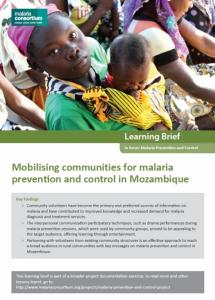Malaria Learning Briefs
These are 4 learning briefs that document key results, challenges and lessons learned in implementing a five-year community involvement intervention to prevent and control malaria through a combination of interventions. These interventions include, in addition to universal coverage bed net distributions, training of community health workers, health committee volunteers and teachers, as well as partnerships with local radio stations to disseminate messages on malaria prevention and control practices. This mix of interventions improved knowledge and practices for malaria prevention, treatment seeking and community management.
The project aimed to support the efforts of the Mozambican government to reduce malaria throughout the country through scale-up of prevention and control efforts with community involvement. The learning briefs cover a range of topics
The briefs are as follows:
Malaria Prevention and Control in Mozambique: scaling up for universal access with community involvement (2011-2017): This project overview provides a summary of the Malaria Prevention and Control Project in Mozambique, its objectives, strategies, and key achievements. This project sought to contribute to a reduction in the number of malaria cases in the country through a range of interventions including working with community groups, training primary school teachers, and distributing long-lasting insecticidal nets (LLINs).
Mobilising communities for malaria prevention and control in Mozambique: This learning brief shares Malaria Consortium’s experience in partnering with existing community structures and building the capacity of community-based volunteers to deliver key messages around malaria, to increase uptake of prevention and treatment services within communities in Mozambique. It describes the intervention, and highlights a number of important lessons and challenges, as well as the necessary next steps to maximize the impact and sustainability of this approach.
Integrating malaria education into primary school activities: This Learning Brief shares Malaria Consortium’s experience in integrating edutainment-based malaria sessions into primary school classroom activities, to provide children with a basic knowledge around malaria transmission, symptoms, prevention, and care-seeking, as part of the Malaria Prevention and Control project in Mozambique. It highlights a number of important lessons and challenges, and the necessary next steps to maximize the impact and sustainability of this approach.
Nets bring good health: a qualitative inquiry: This brief shares Malaria Consortium’s key findings from a qualitative inquiry into mosquito net use and care practices in two Northern provinces of Mozambique, Niassa and Nampula. It explores the experiences and drivers of mosquito net use, non-use or misuse, and local perceptions regarding recommended malaria prevention and control practices.
Source: Malaria Consortium
Date of Publication: March 25, 2019
SIMILIAR RESOURCES
Tools
Examples
- SBCC for Malaria in Pregnancy: Strategy Development Guidance
- Malaria Case Management: Monitoring and Evaluation for SBCC
- Promoting Quality Malaria Medicines Through SBCC: An Implementation Kit
- Roadmap for mHealth Interventions Targeting At-Risk Women
- The Infection Control Symbol Package
- Using Social & Behavior Change To Improve Family Planning Outcomes / Utilisation du Changement Social et Comportemental pour Améliorer le Bilan du Planning Familial en Afrique de l'Ouest
- Behavioral Design for COVID-19 Response
- Behavioral Science Tips for Physical Distancing
- Suaahara Training Guidelines and Participant Handbooks
- Promoting Quality Malaria Medicine through Social and Behavior Change Communication

